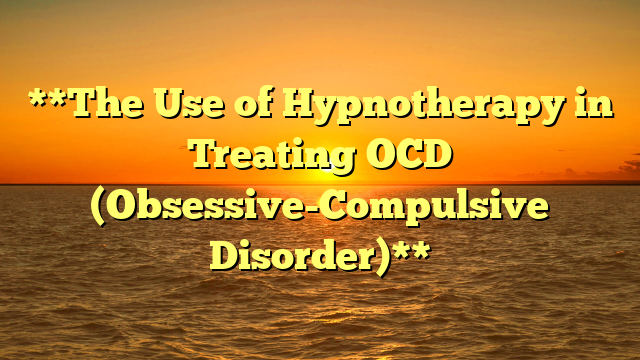
Obsessive-Compulsive Disorder (OCD) is a mental health condition characterized by persistent, intrusive thoughts (obsessions) and repetitive behaviors (compulsions) performed to reduce anxiety. Individuals with OCD often feel trapped in a cycle of obsessive thinking and compulsive rituals, which can significantly impact their daily lives. While traditional treatments such as cognitive-behavioral therapy (CBT) and medication are commonly used, hypnotherapy has emerged as a complementary approach that can help individuals address the subconscious roots of OCD and develop healthier coping mechanisms.
**Understanding Hypnotherapy in OCD Treatment**
Hypnotherapy is a therapeutic technique that uses hypnosis to guide individuals into a deeply relaxed and focused state. In this state, the subconscious mind becomes more receptive to positive suggestions and behavioral changes. Unlike traditional talk therapy, which primarily engages the conscious mind, hypnotherapy works on a deeper level, helping individuals reframe negative thought patterns and break free from compulsive behaviors.
For individuals with OCD, hypnotherapy can be a powerful tool to address the subconscious fears and anxieties that drive obsessive thoughts and compulsions. By altering the way the mind processes these thoughts, hypnotherapy can help reduce the intensity of OCD symptoms and promote long-term healing.
**How Hypnotherapy Helps Treat OCD**
**1. Identifying the Root Cause**
Many cases of OCD stem from underlying fears, past traumas, or deeply ingrained thought patterns. Hypnotherapy allows individuals to explore their subconscious mind and uncover the root causes of their obsessive thoughts and compulsive behaviors. Once these underlying issues are identified, individuals can begin the process of healing and reprogramming their responses.
**2. Reprogramming Negative Thought Patterns**
OCD often involves irrational fears and distorted thinking. Hypnotherapy helps individuals reframe these negative thoughts by replacing them with positive affirmations and logical reasoning. By repeatedly reinforcing new thought patterns in a hypnotic state, individuals can gradually weaken the power of their obsessions and compulsions.
**3. Reducing Anxiety and Stress**
Anxiety plays a significant role in the development and maintenance of OCD symptoms. Hypnotherapy promotes deep relaxation and teaches individuals how to manage stress more effectively. By calming the nervous system and reducing anxiety levels, hypnotherapy helps prevent obsessive thoughts from escalating into compulsive behaviors.
**4. Interrupting Compulsive Behaviors**
Compulsions are often automatic responses to obsessive thoughts. Hypnotherapy can help individuals gain greater control over their impulses by creating subconscious barriers that interrupt the urge to perform compulsive rituals. Through guided hypnosis, individuals can learn alternative coping strategies that reduce the need for repetitive behaviors.
**5. Strengthening Self-Control and Confidence**
Living with OCD can make individuals feel powerless over their thoughts and behaviors. Hypnotherapy works to build self-confidence and empower individuals to take control of their minds. By reinforcing a sense of self-mastery, hypnotherapy helps individuals develop the belief that they can overcome their OCD symptoms.
batmantoto offers a valuable complementary approach to traditional OCD treatments by addressing the subconscious mind, reducing anxiety, and reprogramming negative thought patterns. While it may not replace medical treatments or cognitive-behavioral therapy, it can significantly enhance the effectiveness of an overall treatment plan. By helping individuals manage their obsessions, reduce compulsions, and build self-confidence, hypnotherapy provides a holistic path toward lasting relief and improved mental well-being.









